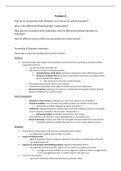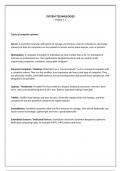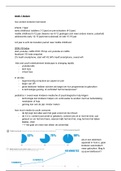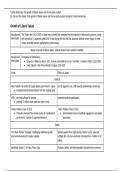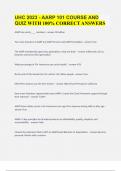Problem 8
How do our personality traits influence us to choose our potential partner?
What is the difference between gender in personality?
How does the minimalist & the maximalist view the differences between genders as
important?
How do different cultures affect our personality & to what extend?
Personality & Situation Interaction
Three ways in which personality interacts with situation:
Selection
process through which people choose specific social environment according to their personalities
(situational selection)
o e.g. who we select as friends, etc.
o Two theories for who is attracted to whom:
Complementary needs theory: people are attracted to those different from them
Attraction similarity theory: people are attracted to those who are similar to them
(bird of feather flock together)
Only evidence for attraction similarity theory
o Personality plays essential role for mate selection
o Preferences of personality traits might be influenced by current relationship
o Assortative mating: people get into long-term relationships with people similar to them &
positive correlations for numerous traits
End of relationship
o Violation of desire theory: breakups occur when one’s desires are not fulfilled
o Emotional stability: most consistent personality predictor of unstable relationships
Emotionally unstable individuals → jealous & explosive
o Satisfaction: high agreeableness, consciousness, emotional stability & openness contributes
more to long term satisfaction than peoples “ideal partners”
Honeymoon effect: satisfaction declines after first 2 years
o Other predictors for divorces→ low in agreeableness & conscien ousness
o Active forecasting: accuracy with which we anticipate emotional reactions to future event
Correlation between anticipated & experience is low → biases distort accuracy
Evocation
How features of personality evoke distress or positive feelings in others
o E.g. highly active children elicit hostility in parents
Hostile attributional bias
o Aggressive people interpret ambiguous behaviour from others as intentionally unfriendly
o E.g. being pumped into
Expectancy confirmation/ Self-fulfilling prophecy (Pygmalion/Rosenthal effect)
o Your idea about the other person, leads to act the person according to your idea
E.g. aggressive person beliefs you are an aggressive person & treats you aggressively
→ you react aggressive back → confirms other’s idea about you
Tow forms of evocation
o Upset other directly by influencing how they act towards others
, E.g. husband throws clothes on the floor → upset his wife
o Indirectly by eliciting actions from other that are upsetting to oneself
E.g. wife undermines husband’s self-esteem, but is angry at him for lack of
confidence
Those high in agreeableness, conscientiousness & low in neuroticism → tend to evoke less
interpersonal conflict
o Willing to compromise
Manipulation
Strategies that people use to influence the behaviour of others
Taxonomy of Eleven Tactics of Manipulation
o Major ways in which people try to influence others in their social world
o Developed though two step procedure
Nominations of acts of influence
Factor analysis of self-reports & observer-reports
Study (Buss)
o Men & women perform tactics equally → only exception is regression tactic (women more)
Who uses which tactics?
o Extraverts use coercion & responsibility invocation
E.g. yelling, “You promised”
o Submissive people → self-abasement & hardball tactics
E.g. tried to look sickly or lying
o High agreeableness → pleasure induction & reason tactic
E.g. describe how enjoyable activity will be
o High in intellect → reason tac c
o Low in intellect → social comparison tac c
“Everyone does it”
Machiavellianism: manipulative strategy of social interaction → uses other people as tools for
personal gain
o High Machs: rely on deception, lying & betray others
Function more effectively in loosely structured social situation
o Low Machs: function effectively in tightly structed, rulebound situations
Sex Differences in Personality
Minimalists vs Maximalists
Minimalist
o Differences small & insignificant
1. Not much practical importance for everyday life
How do our personality traits influence us to choose our potential partner?
What is the difference between gender in personality?
How does the minimalist & the maximalist view the differences between genders as
important?
How do different cultures affect our personality & to what extend?
Personality & Situation Interaction
Three ways in which personality interacts with situation:
Selection
process through which people choose specific social environment according to their personalities
(situational selection)
o e.g. who we select as friends, etc.
o Two theories for who is attracted to whom:
Complementary needs theory: people are attracted to those different from them
Attraction similarity theory: people are attracted to those who are similar to them
(bird of feather flock together)
Only evidence for attraction similarity theory
o Personality plays essential role for mate selection
o Preferences of personality traits might be influenced by current relationship
o Assortative mating: people get into long-term relationships with people similar to them &
positive correlations for numerous traits
End of relationship
o Violation of desire theory: breakups occur when one’s desires are not fulfilled
o Emotional stability: most consistent personality predictor of unstable relationships
Emotionally unstable individuals → jealous & explosive
o Satisfaction: high agreeableness, consciousness, emotional stability & openness contributes
more to long term satisfaction than peoples “ideal partners”
Honeymoon effect: satisfaction declines after first 2 years
o Other predictors for divorces→ low in agreeableness & conscien ousness
o Active forecasting: accuracy with which we anticipate emotional reactions to future event
Correlation between anticipated & experience is low → biases distort accuracy
Evocation
How features of personality evoke distress or positive feelings in others
o E.g. highly active children elicit hostility in parents
Hostile attributional bias
o Aggressive people interpret ambiguous behaviour from others as intentionally unfriendly
o E.g. being pumped into
Expectancy confirmation/ Self-fulfilling prophecy (Pygmalion/Rosenthal effect)
o Your idea about the other person, leads to act the person according to your idea
E.g. aggressive person beliefs you are an aggressive person & treats you aggressively
→ you react aggressive back → confirms other’s idea about you
Tow forms of evocation
o Upset other directly by influencing how they act towards others
, E.g. husband throws clothes on the floor → upset his wife
o Indirectly by eliciting actions from other that are upsetting to oneself
E.g. wife undermines husband’s self-esteem, but is angry at him for lack of
confidence
Those high in agreeableness, conscientiousness & low in neuroticism → tend to evoke less
interpersonal conflict
o Willing to compromise
Manipulation
Strategies that people use to influence the behaviour of others
Taxonomy of Eleven Tactics of Manipulation
o Major ways in which people try to influence others in their social world
o Developed though two step procedure
Nominations of acts of influence
Factor analysis of self-reports & observer-reports
Study (Buss)
o Men & women perform tactics equally → only exception is regression tactic (women more)
Who uses which tactics?
o Extraverts use coercion & responsibility invocation
E.g. yelling, “You promised”
o Submissive people → self-abasement & hardball tactics
E.g. tried to look sickly or lying
o High agreeableness → pleasure induction & reason tactic
E.g. describe how enjoyable activity will be
o High in intellect → reason tac c
o Low in intellect → social comparison tac c
“Everyone does it”
Machiavellianism: manipulative strategy of social interaction → uses other people as tools for
personal gain
o High Machs: rely on deception, lying & betray others
Function more effectively in loosely structured social situation
o Low Machs: function effectively in tightly structed, rulebound situations
Sex Differences in Personality
Minimalists vs Maximalists
Minimalist
o Differences small & insignificant
1. Not much practical importance for everyday life

